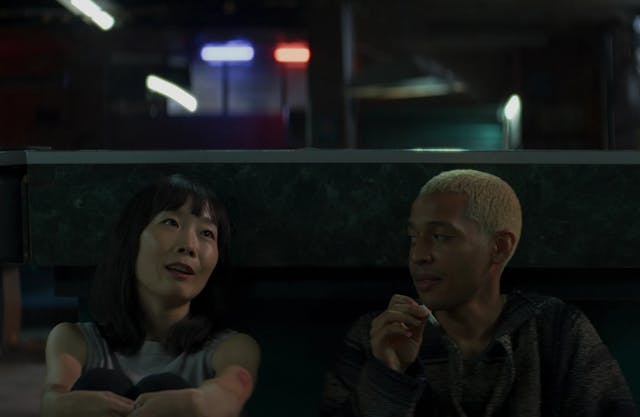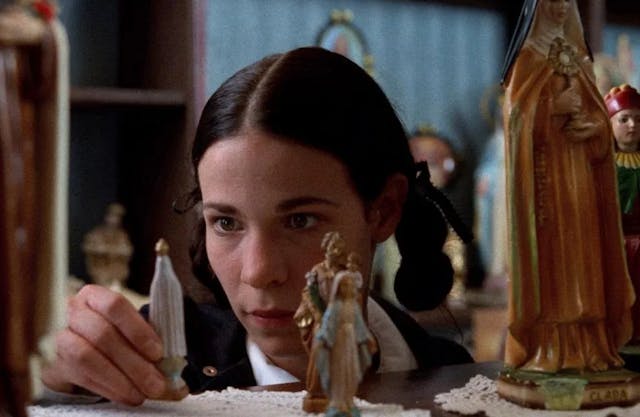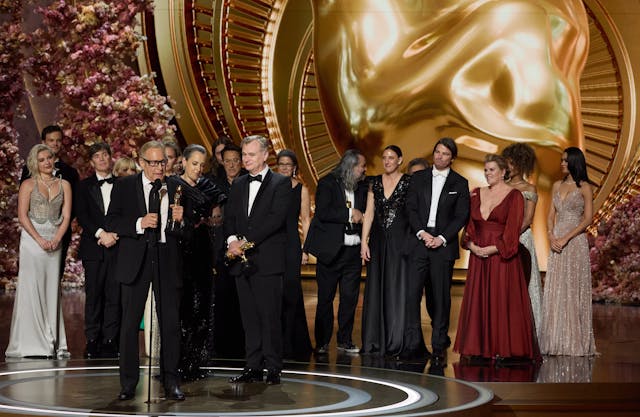Oscars 2024: Who Will Win the Best Picture Academy Award

Things are looking up for "Oppenheimer": Cillian Murphy stars in our fave to take the Best Picture Oscar. / Photo courtesy of Universal Pictures.
On Sunday, March 10, 2024, the Academy of Motion Pictures Art and Sciences will hand out the Oscars. As any movie buff on Earth, we contemplate the event with both skepticism and devotion. We may want to feel superior to it, immune to its charms. But we can. We love to make predictions, even if we know the system is flawed. Is there a single “best movie of the year”? Surely you jest! But lo and behold, here are my takes on the ten nominees. Who will win? Who will lag? Who is just happy to be nominated? Read on!
American Fiction
Cord Jefferson's directorial debut comes after sturdy work as a TV writer, working on episodic comedies like “The Good Place” and prime series like “Watchmen.” And therein lies the rub. There is something safe about his satire about the ghettoization of black culture for white audiences. If anything, the political edge is the least developed aspect of the movie, and it pales in comparison to the actors' rich characterizations and inner conflicts.
Jeffrey Wright is an antihero to root for as Thelonious “Monk” Ellison, the bougie writer who, as a lark, produces a manuscript in the voice of a straigh-outta-rap-videos outlaw. The joke is on him when it turns into a best-seller. Are black creators victims or accomplices of the industry? The movie fumbles the question, despite Issa Rae being right there and game as a sell-out that seems like Monk's perfect opposite. The movie concentrates on painting him as a pretentious gasbag who needs to be a better person. It is a copout, but in true “American Fiction” fashion, the Academy showered it with noms. Wright deserves to be in the run for acting awards, and so does Sterling K. Brown as his recently out gay brother, all anger and hedonism unleashed after years of repression. Can we get a sequel about him?
The movie falls into the “being nominated is an award in itself” camp.
Anatomy of a Fall
Is there anything Hollywood loves more than a good procedural? Perhaps a court drama, a whodunnit mystery, or, in this case, a did-she-do-it. “Anatomy of a Fall” is all those things, as well as a tour de force for German actress Sandra Huller. Surprisingly, it garnered five nominations, including Best Picture. She plays a successful writer who may or may not have pushed her annoying loser of a husband from the balcony of their picturesque cabin in the Alps.
The movie has gathered momentum since winning the Palme d'Or at the Cannes Film Festival. When France chose “The Taste of Things” as its candidate for Best Foreign Film, the members of the Academy came through, showering it with five nominations and pushing it into one of the ten slots for Best Motion Picture of the Year. Alas, the presence of “The Zone of Interest,” which also stars Huller, may dilute the vote of the most sophisticated voters. Do you see the people who pushed “CODA" to the winning line putting this prickly thriller at the top of their lists? I think not.
Barbie
Is there anything left to say about Greta Gerwig's prodigious hat trick? She took a mercenary concept and turned it into a solid comedy. “Barbie” is much more than a cash-in or a glorified commercial designed to sell more dolls and nourish Mattel's bottom line. Margot Robbie and Ryan Gosling sell the old conceit of toys invading the real world and getting an education on the ways of humanity. In this case, we are dealing with gender and the pervasiveness of the patriarchy. It's heady stuff for a candy-colored fantasia. It’s easy to see why it topped the box office in 2023. It was everything to everybody. But is it the best of the year? No.
I’m not sure if the outrage about Gerwig missing a Best Director nomination will improve its chances. As consolation prizes go, the Best Movie of the Year Oscar feels like overkill in this case. Do you want recognition? In the immortal words of Don Draper, everybody's favorite fantasy ad man, "That's what the money is for!”
The Holdovers
Nostalgia is a powerful drug, and anybody with a thing for seventies American cinema fell for Alexander Payne's "The Holdovers” - yours truly included -. We fell hard. How could we not? The action takes place at a Boston private school over the 1970-1971 winter break. The art direction, the costumes, the cinematography, everything looks period-appropriate and transporting. Paul Giamatti is aces as the teacher everybody loves to hate, tasked with babysitting the kids who get stranded at the school without a family to take them in over Christmas break. The group thins down to just one, Angus Tully - played by newcomer Dominic Sessa, so good that there was talk about him getting nominated for Best Supporting Actor. Cafeteria maven Mary (Da'Vine Joy Randolph) takes care of the cooking while grieving for her son killed on the Vietnam frontlines.
The movie falls on the gentler side of the spectrum when it comes to aping the '70s American New Wave. It’s more heartwarming than scalding, which might be a plus for older Academy members. It's close, but no cigar.
Killers of the Flower Moon
Martin Scorsese's adaptation of David Gran' true-crime historical account is so uncompromising that it takes almost three hours and a half to detail the genocide of the Osage people in early XX-Century Oklahoma. Murder is the trade of local big man William Hale (Robert De Niro), aided by his dumb nephew Ernest Burkhart (Leonardo Dicaprio). Like the rest of the white townsfolk, they are after the natives' money. The oppressed turned overnight millionaires, thanks to the oil wells in their land. Since the law does not allow them to manage their own money - it does not see them as competent - every white devil wants to become a legal guardian to an Indian. It's better yet to marry one. Or rather, marry into their fortune. Local law enforcers don't bother to investigate too much into the sudden death of an Osage spouse, or two, or three, or many. The male leads work at the level of their career-best roles, but Lilly Gladstone steals the movie away as Mollie, the Osage woman who falls for Ernest despite herself - and himself.
This is my favorite of the lot, but I’m aware the Academy tends to turn its back on Scorsese when he gets serious. It's not by accident that he got his Oscar for “The Departed” (2006), a police thriller that pales in comparison to, say, classics like “Raging Bull” (1980). Also, the old guard among Academy voters might resent getting a history lesson that questions Hollywood's western myths.
On a side note: can we campaign for a Best Trailer award? The teaser closing with the line "Can you find the wolves in this picture?" Amazing!
Maestro
Biopics of illustrious men and women used to be the bread and butter of the Oscars. It was even better if a handsome star transformed physically to pass for the perso in question. Wait, he is directing, too? Let's hand the statuette with his name NOW! Or perhaps not anymore. Yes, “Oppenheimer” is the front runner, but the melding of one persona into another is not necessarily its main asset.
If Bradley Cooper's "Maestro” had come out a decade or two ago, it might have sailed uncontested to the podium. The life of legendary composer and conductor Leonard Bernstein is rich in incidents and cultural importance. Alas, the movie seems to have rubbed people the wrong way. Everybody seems put off by Cooper's elation at finally getting his passion project done. Blame it on the cynicism that looks askew at enthusiasm, especially when directed towards a giant of the arts. It's a rich irony. One of Bernstein's claims to fame was his openhearted quest to bring classical music to the masses. He is a champion for our anti-intellectual times.
As things stand, the public, the media, and the industry seem to have turned against Cooper. His zealousness for the project translates in the court of public opinion as being extra. Every banal utterance he makes is dissected mercilessly on social media. The man deserves a break. Far from building a vanity project around himself, he cedes the spotlight to Carey Mulligan as Felicia Montealegre, Bernstein's wife. The sophisticated, worldly woman knowingly married a queer man, but that knowledge did not shield her from heartbreak. The movie could go deeper into exploring the sexual politics of the era and how homophobia shaped the relationship but instead takes it at face value.
“Maestro” is not as bad as they claim, but not as good as it could be. Also, it's hard for me to take it seriously because I can't see the title without thinking of one of Elaine Benes' suitors in "Seinfeld": The Maestro! I might not be alone in this.
Oppenheimer
Who would have thought that Christopher Nolan would cash in all the chips he earned by making the “Batman” trilogy and use the clout to make the most adult blockbuster of the XXI Century so far? "Oppenheimer” is a fascinating historical drama that eschews the heroics of the common biopic in exchange for a sober contemplation of how power corrupts genius. The thrill of scientific discovery leads to destruction. The epic scope is decidedly human, concentrating on a large cast of characters that aid, influence, and sometimes hinder Oppenheimer's efforts to harness atomic power to win World War II. Alas, the price is steep. The hero's achievement pales in comparison to the thousands of lives of innocent Japanese civilians wiped away by his invention.
The bravura sequence that hints at the carnage in Hiroshima and Nagasaki dismayed the literalist brigade. Why not show it? Well, why show it at all? Allusion is not erasure, just as representation is not an endorsement. For me, the elliptical hallucination that takes its place is Nolan at his smartest. He recognizes it was not his place to turn tragedy into spectacle. The image of elated Americans torn by blinding light hints at the crime committed against our common humanity. It’s the moment that pushes the movie into greatness. On Oscar night, we will feel silly for doubting that Nolan had it in the bag from the get-go.
Past Lives
This candidate fills token indie representation - “American Fiction” feels like a studio picture of yore -. Celine Song's "Past Lives” is a warm, searching romance about two couples who share a woman in common. The first one is the very real marriage between Nora (Greta Lee), a South Korean immigrant, and her white American husband, Arthur (John Magaro). The second one is the make-believe relationship that never was between Nora and her childhood best friend, Hae Sung (Teo Yoo), whom she left behind when her parents decided to move to the US. Past and present collide when the dashing Have Sung decides to visit her in New York.
Song's chamber piece of romantic illusion and disillusion takes place in a bohemian New York that you can see turning into a time capsule before your eyes. Greta Lee gives a star-making performance, but Magaro is the stealth MVP as the man whose life hangs in the balance. That he was never in the conversation as Best Supporting Actor is a travesty.
Poor Things
“Candide” meets “Frankenstein” meets female sexual liberation in this colorful, bawdy satire by Greek director Yorgos Lanthimos. Emma Stone is fearless as a suicidal woman resurrected with the brain of a child. Her accelerated learning curve soon leads to uninhibited sexuality, shocking the candy-colored Victorian fantasy world she inhabits. The movie is a gas, if a tad too long. Furthermore, it turned out to be Lanthimos' biggest success at the box office, with $104 million in ticket sales to date.
I love the feeling and aesthetics, reminiscent of Jean-Pierre Jeunet and Marc Caro'svies - look for “Delicatessen” (1991) and “The City of Lost Children” (1995) -. I give the movie extra points for sticking it to the prudish and retrograde "sex ruins movies" brigade. However, this is too light to stand above the competition.
The Zone of Interest
Cannes is riding high on the Academy's estimation. We have both the Palm d'Or winner and the virtual second place winner, the Grand Prix holder "The Zone of Interest." Jonathan Glazer'sark consideration of a Nazi family enjoying their dream life under the shadow of the holocaust is a film festival favorite. The movie drops us in the middle of the routine of concentration camp administrator Rudolf Hoss and his wife Hedwig (Sandra Huller). They go about their days while the sounds of carnage come over the wall that separates their garden from Auschwitz. Like "Oppenheimer" not showing you the atomic devastation, we never see the results of the violence Hoss deploys. But we do hear it.
It's chilling stuff, but this is the kind of movie you respect and admire, not exactly love. And we know the Academy is all about love.
Watch “Lonely”
“Lonely” is a powerful reminder that no one is ever truly alone, and there is always someone out there who cares and wants to help.
Stream NowWant to get an email when we publish new content?
Subscribe today




























